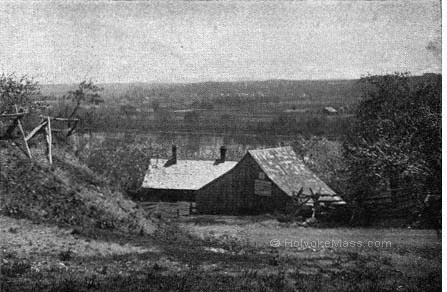(4.) Have a thorough knowledge of your affairs; leave nothing at loose ends; be exact in every transaction. The chief source of quarrel in the business world is what is termed "an understanding," ending commonly in a misunderstanding. It is not ungenerous or ignoble always to insist on a full straight-out bargain, and it falls in with the thrifty habit.
It is a very simple matter to name, but the habit of keeping a strict account of personal expenses down to the penny has great educational power. Keep such a book, tabulate its items at the close of the year, — so much for necessaries, so much for luxuries, so much for worse than luxuries, — and listen to what it reports to you.
(5.) Debt is the secret foe of thrift, as vice and idleness are its open foes. It may sometimes be wise for one to put himself under a heavy debt, as for an education, or for land, or for a home; but the debt-habit is the twin brother of poverty.

A Valley View.
|
(6.) Thrift must have a sufficient motive. There is none a young man feels so keenly, if once he will think so far, as the honorable place assigned to men of substance. No man is quite respectable in this nineteenth century who has not a bank account. True or false, high or low, this is the solid fact, and for one, I do not quarrel with it. As most of us are situated in this world, we must win this place and pay its price. The common cry of "a good time while we are young" is not the price nor the way. Mr. Nasmyth, of England, an inventor and holder of a large fortune made by himself says, "If I were to compress into one sentence the whole of my experience, and offer it to younger men as a rule and certain receipt for success in any station, it would be comprised in these words, Duty first, pleasure second! From what I have ssen of young men and their after progress I am satisfied that whis is called "bad fortune," ‘ill luck,’ is, in nine cases out of ten, simply the result of inverting the above maxim.&qiot;
We cannot properly leave our subject until we have referred more particularly to spending. Thrift decided how, and to what extent, we shall both spend and save. We must leave ample room for the play of generousity and honor; we must meet the demands of church and home and community with a wise and liberal hand; we must preserve a keen and governing sense of stewardship, never forgetting the ultimate use of money, and the moral and intellectual realities that underlie life.
If I were to name a general principle to cover the whole matter, I would say, Spend upward, that is, for the higher faculties. Spend for the mind rather than for the body; for culture ranther than for amusement. The very secret and essence of thrift consists in getting things into higher values. As the clod turns into a flower, and the flower inspires a poet; as bread becomes vital force, and vital force feeds moral purpose and aspiration, so should our saving and outgo have regard to the higher ranges and appetites of our nature. If you have a dollar or a hundred, to spend, put it into something above the average of your nature that you may be attracted to it. Beyond what is necessary for your bodily wants and well-being, every dollar spent for the body is a derogation of manhood. Get the better thing, never the inferioe. The night supper, the ball, the drink, the billiard table, the ministrels, — enough calls of this sort there are, and in no wise modest in their demands, but they issue from below you. Go buy a book instead, or journey abroad, or bestow a gift.
I have not urged thrift upon you for its own sake, nor merely that you may be kept from poverty, nor even for the ease it brings, but because it lies near to all the virtues, and antagonizes all the vices. It makes soil and atmosphere for all healthy growths. It favors a full manhood. It works against the very faults it seems to invite, and becomes the reason and inspiration of generousity.
|